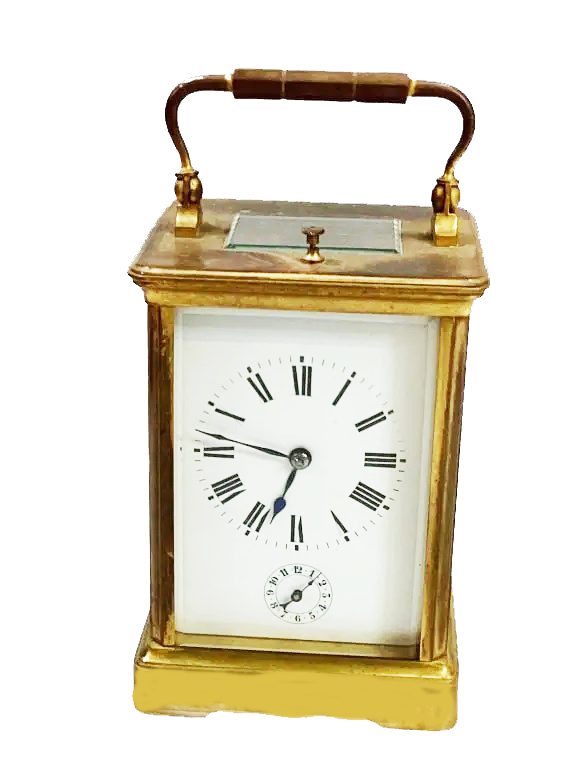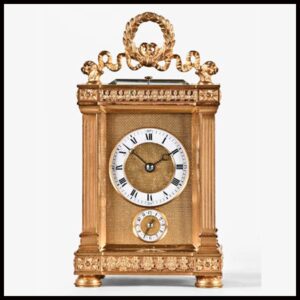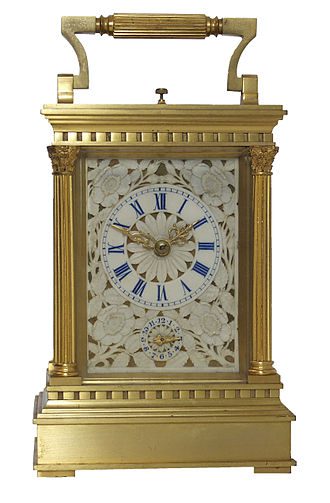
When it comes to carriage clocks, one name that sticks out is among the manufacturers of fine French Carriage clocks is Armand Couaillet (1865–1954) who was a French clockmaker from Saint-Nicolas-d’Aliermont in Normandy. The French Carriage Clock industry has a long and illustrious history, renowned for its exquisite craftsmanship and attention to detail. These clocks, often made of brass or bronze, were popularized in the 19th century and continue to be sought after by collectors worldwide. With their unique design and mechanical precision, the French clocks became a symbol of luxury and refinement. Today, these timepieces serve as both functional objects and elegant decorative pieces, showcasing the timeless beauty of French horology with an antique small clock.
COUAILLET, WAS A RENNAISANCE MAN

Carriage Clocks by Couaillet, are distinguished by his trademark “feathers” as if on an arrow, and usually found as part of the curved “arrow” showing the direction to wind the vintage small clock. In 1890 Couaillet started a business producing carriage clocks; shortly afterwards his three brothers joined the business.
Following his building a very successful clock business, he later had successes in venues other than his wonderful carriage clocks: In 1919, went on to design an electric car, one of the earliest, if not only electric car in its day. In 1925, he went on to build a business, once again specializing in the manufacture of alarm clocks and timers. His greatest works, in my opinion, will always be his wonderful carriage clocks.
CARRIAGE CLOCKS AS A SYMBOL OF ELEGANCE AND SOPHISTICATION.
Carriage clocks have long been a symbol of sophistication and timeless elegance. These compact, portable timepieces were once the hallmark of the affluent, gracing the mantelpieces and desks of the aristocracy. Today, the art of carriage clock-making continues to captivate collectors and enthusiasts alike.
At the forefront of this enduring tradition are the skilled artisans, as in the case of Couaillet,
who dedicate their craft to preserving the legacy of French carriage clocks. These masterful clockmakers, with their unwavering attention to detail and technical expertise, ensure that each antique small clock they produced was a testament to the rich horological heritage of the past.
Whether you’re a seasoned collector or simply appreciate the timeless beauty of these horological marvels, investing in an antique French timepiece is a decision that will reward you with a piece of history that will continue to enchant you for generations to come. The allure of this type of vintage small clock is undeniable, and the passion of its makers ensures that this captivating art form will continue to captivate and inspire.
WHAT MAKES CARRIAGE CLOCKS SO SPECIAL
Carriage clocks are synonymous with the rich horological heritage of France. These French master clockmakers meticulously craft each antique clock with unparalleled attention to detail and technical expertise. Investing in an antique French clock not only brings home a piece of history but also a timeless beauty that will continue to enchant generations. The allure and passion behind the art form ensure its enduring captivation and inspiration.

Aside from the beauty of the dials, the bronze work and the precision that I personally enjoy is the “repeat” function, where with the press of the button atop the carriage clock, it will repeat the effort of the last time it chimed. Normally the clock will announce the hours. Upon repeat it will count off the hours, quarters, and/or minutes. This, of course, depends on the quality of the clock. Some will repeat just the hours, others may repeat the quarter and half hours.
Come visit our page to see and enjoy the many different types of antique small clocks that you can purchase from valuableclocks.com The featured image of a Couaillet clock can be viewed live at the Saint-Nicolas-d’Aliermont museum in Normandy.


